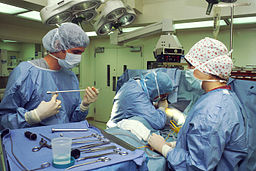Thoracoscopy Deemed “Valuable and Safe” for Mesothelioma Patients
 Pleural mesothelioma patients who are recommended for medical thoracoscopy can rest assured that the procedure is “a valuable and safe” diagnostic tool.
Pleural mesothelioma patients who are recommended for medical thoracoscopy can rest assured that the procedure is “a valuable and safe” diagnostic tool.
That is the message from Chinese researchers after an analysis of nine years of medical thoracoscopies on more than 800 patients with malignant mesothelioma and other pleural cancers at a Beijing hospital.
What is Medical Thoracoscopy?
Medical thoracoscopy is a minimally invasive procedure that can help doctors diagnose or treat the symptoms of lung diseases like pleural mesothelioma.
Mesothelioma is an especially difficult cancer to diagnose since many of its symptoms mimic those of other diseases, including lung cancer. Patients with thickening of their pleural membrane (where mesothelioma tumors start) or with excess lung fluid called pleural effusion are often recommended for medical thoracoscopy.
By means of a single slender probe, thoracoscopy allows the physician to visualize the surface of the lung and find the cause of pleural fluid. It can also help guide the removal of some tissue for mesothelioma diagnosis and can be used to administer medications on the pleura to help stop the buildup of fluid.
Medical thoracoscopy should not be confused with thoracoscopic surgery which is an invasive procedure that uses several ports for viewing and working in the chest cavity.
Evaluating Thoracoscopy for Mesothelioma Patients
To evaluate the diagnostic value of thoracoscopy for mesothelioma patients and others with lung-related cancers, researchers with Beijing Institute of Respiratory Medicine and Beijing Chaoyang Hospital reviewed 833 medical thoracoscopies from 2005 to 2014.
They were specifically interested in the 342 patients who were ultimately confirmed to be suffering from malignant pleural effusions, the buildup of fluid around the lungs that is common in malignant mesothelioma and several other cancers.
In the study, the top three causes of the pleural effusions were metastatic cancers (79.5%), malignant mesothelioma (10.2%) and lymphoma (2.9%). None of the patients diagnosed with thoracoscopy had any adverse reactions to the procedure.
“Medical thoracoscopy is a valuable and safe tool in diagnosing malignant pleural effusion and minimal complication rates,” writes study author Yang-Bing Wu, MD, a respiratory and critical care medicine specialist.
The new article was published in a recent issue of BMC Pulmonary Medicine.
Source:
WU, YB, et al, “Diagnostic value of medical thoracoscopy in malignant pleural effusion”, August 4, 2017, BMC Pulmonary Medicine





